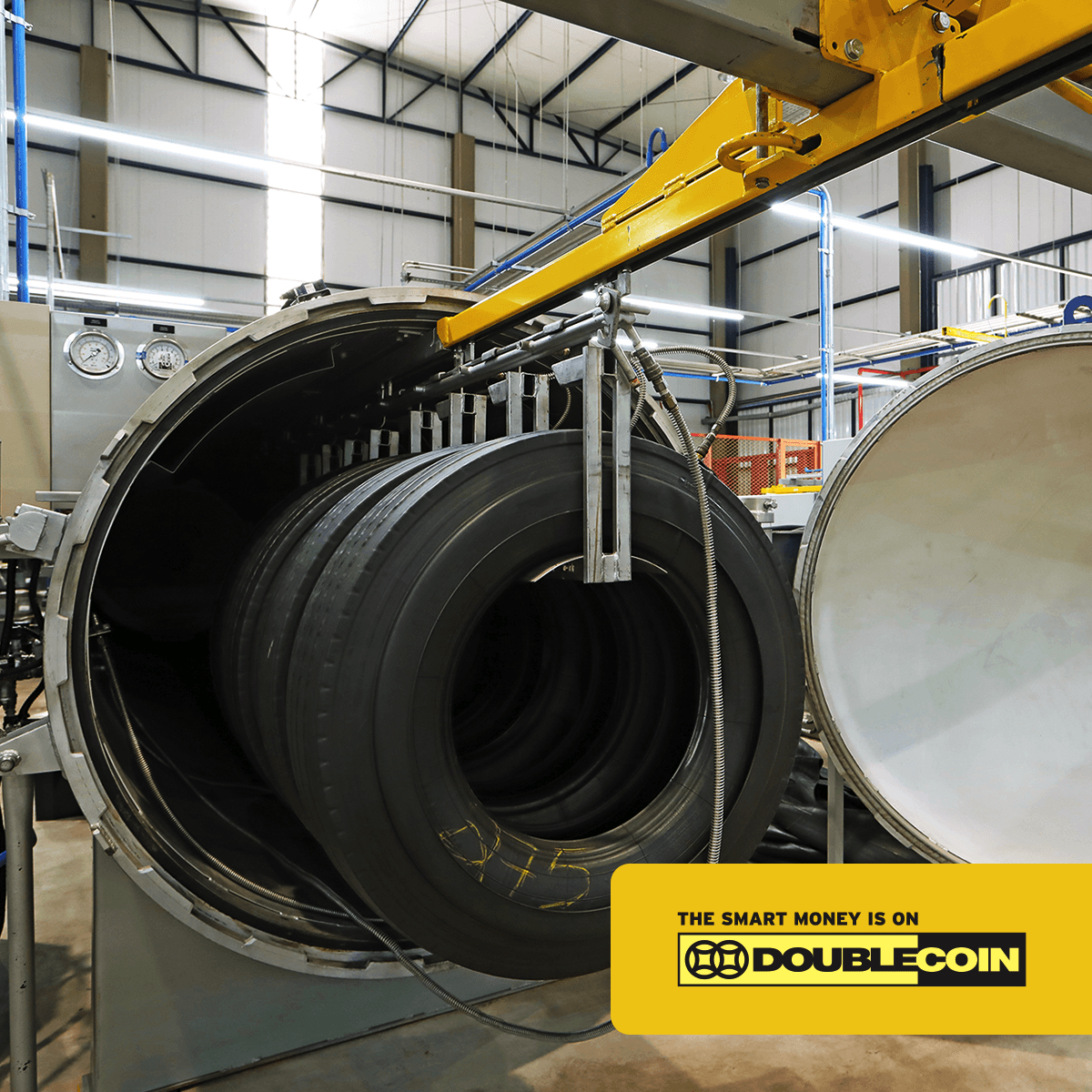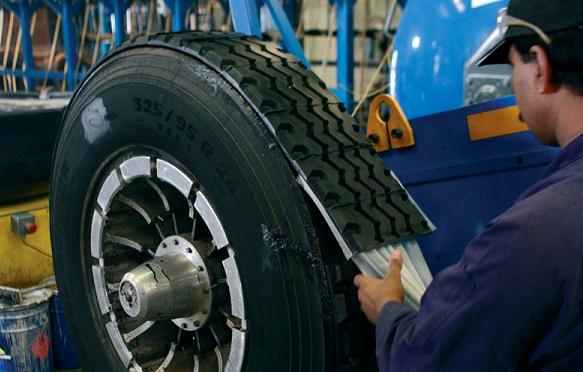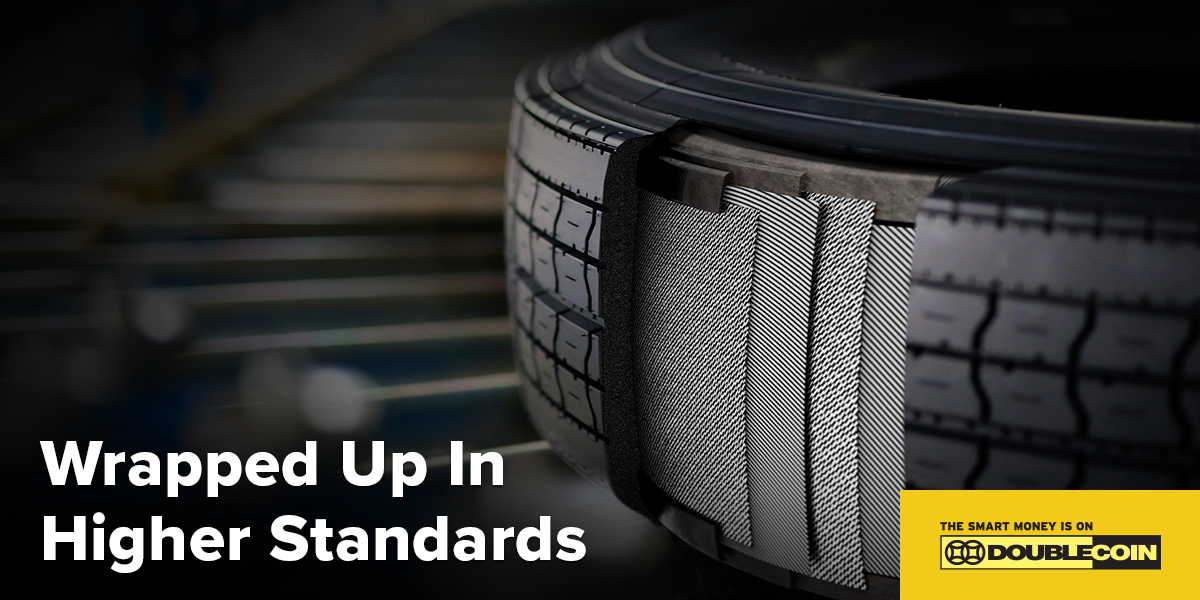With diesel prices and other trucking fleet costs through the roof, fleet managers are searching for savings and operating efficiencies. If you have shied away from retreads for whatever reason, maybe it’s time to rethink. Retreads are a sustainable way for fleets to optimize productivity while cutting down on cost per mile.
Double Coin casings, by the way, get rave reviews for retreadability. In fact, retired aggregates hauler Maurice Deamel said, “I would walk past a pile of Michelins any day for a Double Coin. I ran Double Coin recaps on my drives for years because the sidewalls stood up really well. I never blew a Double Coin in some really harsh operating conditions.”
retired aggregates hauler Maurice Deamel said, “I would walk past a pile of Michelins any day for a Double Coin. I ran Double Coin recaps on my drives for years because the sidewalls stood up really well. I never blew a Double Coin in some really harsh operating conditions.”
We are so confident in the quality of Double Coin casings that we enhanced our warranty to seven (7) years and three (3) retreads for all Double Coin truck and bus radial (TBR) tire products.
Retread Myths
To help you re-evaluate retreads if you’ve been hesitant previously, here are some common retread myths which need debunking:
Myth #1 — Retread tires are unsafe.
Retreading uses advanced technology, equipment and comprehensive inspection techniques. Retreaded tires are held to the same quality standards as new tires.
 The safety of your tires, whether new or retread, largely depends on the fleet’s tire maintenance practices. For instance, if you are operating your tires in an under-inflated condition, they will experience excessive sidewall flexing and, thus, heat buildup. Heat buildup can lead to tread and casing separation, regardless of whether the tire is new or a retread.
The safety of your tires, whether new or retread, largely depends on the fleet’s tire maintenance practices. For instance, if you are operating your tires in an under-inflated condition, they will experience excessive sidewall flexing and, thus, heat buildup. Heat buildup can lead to tread and casing separation, regardless of whether the tire is new or a retread.
Retreads have a reputation for causing that rubber debris, often called “alligators,” found on the side of roads. However, well-established studies have determined that the majority of tire debris found on the side of the road comes from new tires, not retreads.
Myth #2 — Retreads underperform new tires.
The old saying “You Get What You Pay For” does not necessarily apply here. Retread tires cost less than new tires but a quality retread can deliver comparable performance to a new tire.
The key when selecting retreads, just as it is with a new tire, is making sure you are purchasing the right retreads for the application. Your tire dealer can guide you on the correct wheel position and tread pattern for your applications.
Myth #3 — Retreads will end up costing more in the long run.
Since retreads are made from existing casings, the most expensive part of a tire, they cost less to produce than new tires. These savings are passed on to fleets and owner operators.
Since a well-maintained retread will deliver comparable wear to a new tire, retreading is a very effective way to lower your total tire ownership costs. Retreads typically cost as much as 30 to 50 percent less than new tires.
Myth #4 — Retreads don’t perform as well in harsh applications.
Again, proper maintenance and choosing the right tire for a particular application is the key here – not whether the tire is new or a retread.
Just like new tires, retreads come in a variety of tread patterns and compounds. For instance, If you are operating in mixed service situations where you navigate challenging off-road environments, there are retreads with cut resistant compounds and high traction capabilities to fit the bill.
Some fleets opt to retread their own application-specific tires that they already know are a fit for certain applications. Knowing the load and inflation history of your tires can help you determine which casings are best suited for specific applications.
Conclusion
Don’t let these demonstrably false myths prevent you from utilizing a proven system for reducing your tire costs. Work with a quality retreader/dealer to create a customized cradle to grave tire management program to ensure you are obtaining the lowest total cost of tire ownership.
For more information on the advantages of retreading, here’s a blog post covering advice from longtime trucking editor Jim Park of Heavy Duty Trucking magazine.

Double Coin tires deliver exceptional value for a wide variety of commercial applications, including trucking, construction, mining, ports and agriculture. Our goal is to provide valuable information for those working in these industries.
We’re excited to showcase our customer, @weza_landscaping, putting the REM-2S OTR tire to work, effortlessly clearing snow from city streets! Designed for year-round performance, this tire thrives in the toughest winter conditions. Whether it’s ice, gravel, or packed snow, the…
Twitter feed video.
🚨Heavier, Deeper Tread Tires from Double Coin! 🚨
See the REM-4 and REM-26 in action! With their heavier build and deep tread, they outlast the competition, making them perfect for baggage tugs and other airport vehicles.
🔧 REM-4: Drive tire (7.00R12) with unmatched depth for…
Twitter feed video.
🚨 New GSE Tires Alert from Double Coin! 🚨
Meet the REM-4 and REM-26 – all-steel radial construction for extreme durability and puncture resistance. Perfect for baggage tugs and other airport ground vehicles.
⚙️ REM-4: Drive tire (7.00R12)
⚙️ REM-26: Steer tire (6.00R9)
Stock…
Twitter feed video.
“Breaker one-nine, this here’s the Rubber Duck.” Convoy (1978) RIP Kris Kristofferson 1936-2024 #KrisKristofferson #convoy
– Convoy –
via @YouTube
Add this ID to the plugin's Hide Specific Tweets setting:


